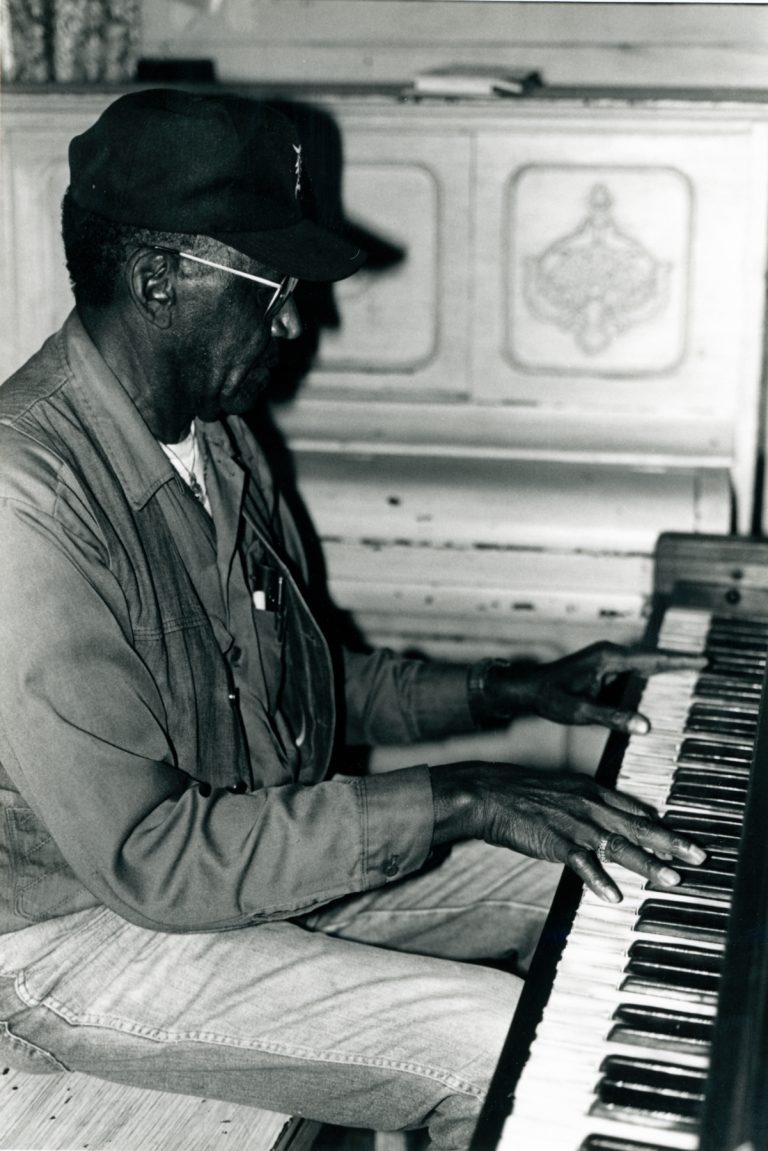Charles Nelson lives in McCall Creek, in Franklin County, Mississippi, on land purchased by his father in the 1930s, less than five miles from the house in which he was born. Nelson is a talented, although unrecorded, boogie-woogie blues pianist—a style that features rhythmic left hand with melodies played with the right, is largely instrumental and often performed solo. Although he seldom plays at festivals or for audiences in general, Nelson’s living room is dominated by three pianos. It’s a well-deserved break; he’s played for decades across the country in churches, lodges and bars, fish fries, and logging camps.
Charles Nelson was born into a musical family, in a small house on the bank of a creek in Franklin County, 1919. His father, mother, and three of his brothers could play the guitar and piano, and Nelson learned by watching and listening. He is extremely proud of his family’s legacy in McCall Creek as black landowners since the 1930s. Looking out his front door and sweeping his hand through the air, Nelson says, “We owned all this, over 100 acres, bought it in ’36. We moved here and built the house. We paid for it. It had a little timber on it we could sell. We cut the timber, carried it to the sawmill and they sawed the lumber. Then we brought it back here and built the house with it.”
As a young man, Nelson remembers accompanying a cousin to fish fries, weekend parties held outdoors, with food, drinking, and dancing, where they would provide the entertainment, playing piano blues in the style of artists such as Pinetop Perkins. Following the fish fry, after midnight they would walk several miles to a logging camp and play until dawn. The camp was mobile, following dummy lines, temporary rail lines laid to move logging equipment in and move timber back to the sawmill.
During World War II, Nelson found himself on the Aleutian Islands near the Bering Sea, as a member of the Army infantry and having very little to do. He used this time to purchase 78s and hone his piano skills. Nelson was one of five brothers that came home safely after serving in the war.
Following the war, Nelson returned to McCall Creek and continued to play, but eventually followed family members and the promise of higher salaries to Utah, which was a strange topography compared to Mississippi. “I hated it when I first went out there—all that snow and tumbleweeds. But I started running into some good-looking girls out there and that kind of changed my mind.” In some ways though, Nelson felt right at home out west. “[Lots] of the people in Utah, they came from Louisiana and Mississippi and East St. Louis—blues people from all over. Just people that migrated across the country. They were all there from everywhere. I just played [in Utah] for fun at that big lodge [the Elk’s]. We used to go up there and play the piano, drinking beer. Nothing sophisticated.”
In 1971 Nelson felt the pull of Mississippi and his family, returning to live on the family farmland in McCall Creek. Since that time, he has performed at selected festivals and gatherings like the Great Day at Bude and at various churches in the area, but now generally shuns such engagements. He enjoys playing piano for himself, riding around the area in one of his cars or trucks, and keeping sharp, with dozens of pairs of shoes at his disposal. At 84, the pianist feels that he’s done what is required of him. “I’m not volunteering for nothing. Even when I was in service, I didn’t volunteer. To keep from going to KP in Fort Benning I run a 2nd Lieutenant and a Corporal all day long—never could catch me!”
-Scott McCraw

